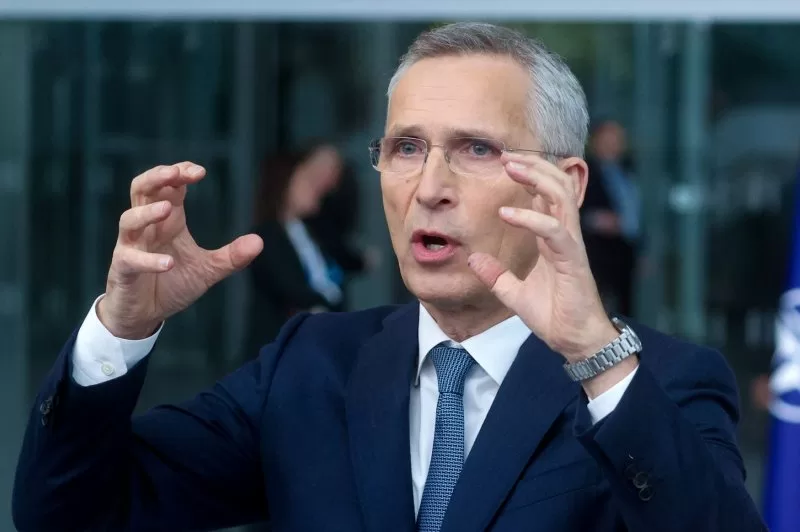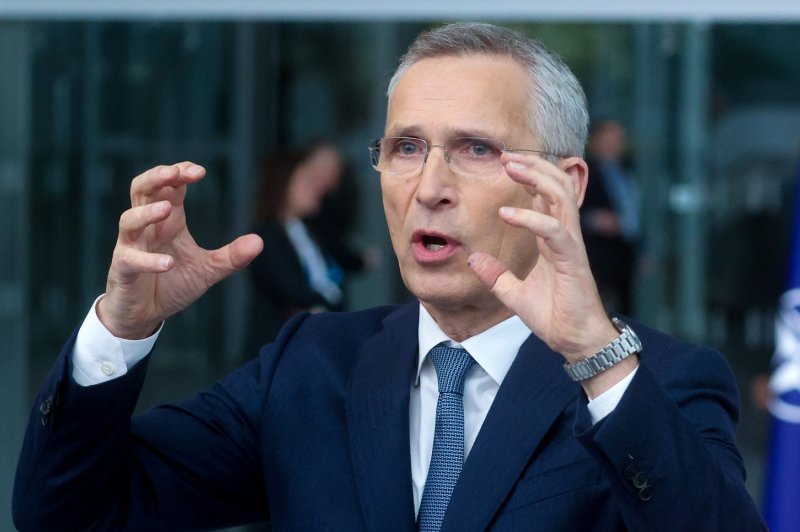Speaking ahead of a NATO summit in Brussels on Wednesday, secretary-general Jens Stoltenberg said ministers would mull a multi-year financial pledge for Ukraine “to sustain our support” which he said needed to focus “less on short-term “voluntary contributions” and more on longer-term NATO commitments. Photo by Olivier Hoslet/EPA-EFE
April 3 (UPI) — NATO defense and foreign ministers were set to discuss a multi-year military funding package for Ukraine during a meeting of the mutual defense alliance in Brussels Wednesday.
Speaking ahead of the two-day conference secretary-general Jens Stoltenberg said ministers would weigh the longer-term financial pledge “to sustain our support” which he said needed to focus less on short-term “voluntary contributions” and more on multi-year NATO commitments.
“Ukraine has urgent needs. Any delay in providing support has consequences on the battlefield as we speak,” Stoltenberg said. “So we need to shift the dynamics of our support.”
Stoltenberg was expected to propose a $107 billion five-year plan with NATO leaders expected to finalize the details Wednesday, Politico reported.
It wasn’t immediately clear how the plan would be funded, but one proposal is to borrow NATO’s existing means-based funding formula under which member states pay in a percentage derived from their gross national income.
Stoltenberg refused to confirm the figures in the plan and played down expectations of a breakthrough on Wednesday or Thursday.
“We are transforming NATO’s comprehensive assistance package into a multi-year program of assistance. This ministerial will set the stage for achieving consensus on these issues as we prepare for the Washington Summit [in July],” Stoltenberg said.
“The reason why we do this is the situation on the battlefield in Ukraine. It is serious. We see Russia is pushing and we see how they try to win this war by just waiting us out.
“We need to answer by sending a clear message of practical support, financial support, and an institutional framework that ensures that we are there for the long haul to be able to end the war.”
Stoltenberg said that with NATO allies already accounting for 99% of all military support to Ukraine expanding that assistance under NATO would make their efforts more efficient and more effective.
British Foreign Secretary David Cameron called on the allies to ramp up their defense spending — but did not address the Ukraine multi-year funding plan.
“The most important thing we can do to make sure this alliance continues to grow and continues to strengthen is to ensure that we all spend over 2% of our GDP on defense,” he said as he arrived at NATO headquarters.
“Many more countries are now doing that, but we need every country to do that.
“Frankly, that’s the best thing we can do to make sure the NATO summit in Washington this summer is a success, and it’s also the best way to prepare for the American elections in the autumn, whatever their outcome may be,” Cameron said referring to threats by presidential hopeful Donald Trump to pull the United States out of NATO unless ‘delinquent’ members pick up their share of the tab.
The Polish and Canadian foreign ministers, Radek Sikorski and Melanie Joly both expressed support for the secretary-general’s efforts.
“Putin thought that he would divide us; now we’re stronger than ever,” Joly said.
“We know also we have to continue to invest in supporting militarily and at all levels Ukraine,” she said.
NATO’s annual budget for 2023 to 2024 was, however, far short of the $107 billion at a little over $5 billion.
With a $60 billion U.S. military aid package stalled in Congress for the past four months, the effort is part of a drive for the alliance to step up and assume more responsibility for arming Ukraine in place of the current multilateral U.S.-led effort coordinating the delivery of military assistance.

